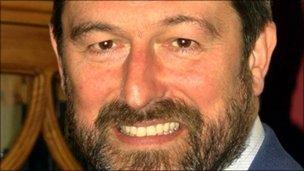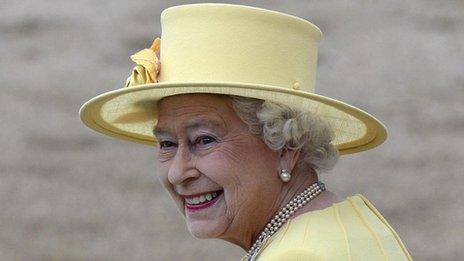Billy Leonard's journey from RUC reservist to Sinn Fein MLA
- Published
- comments

The former RUC reservist later became a Sinn Fein MLA
If you didn't catch Inside Politics last weekend, it's worth a listen on the BBC iPlayer as my guest Billy Leonard's story is intriguing on both a human and a political level.
The former East Londonderry MLA quit active politics before last year's Stormont election to concentrate on writing a book.
His memoir, "Towards a United Ireland - an uncompleted journey" is out at the end of the month.
It's the story of how a Lurgan Protestant and one time member of the RUC Reserve crossed the divide, becoming first an SDLP activist then a Sinn Fein MLA.
As the only former Sinn Fein MLA who can remember waving a Union flag as a child during a visit by Prince Philip to Northern Ireland, it was interesting to hear Billy Leonard's educated guess that Martin McGuinness will meet the Queen when she visits at the end of this month (although as an Irish republican he couldn't resist adding that he cared more about Enda Kenny's latest thoughts on an all-Ireland football team than the details of the Royal visit).
The former MLA was the son of an RUC officer - his upbringing was typically unionist.
But he always had an interest in wider developments, such as the US Civil Rights movement.
However it wasn't just politics but love which played a role in his unusual trajectory - his girlfriend, then wife, came from the other side of the tracks on Lurgan's nationalist Kilwilkie estate.
In his book, Mr Leonard talks about what he views as sectarian attitudes towards him, within both the SDLP and Sinn Fein.
He also acknowledges that within Sinn Fein he had to deal with an additional layer of mistrust because of his previous membership of the security forces.
Influence
The memoir is revealing on the discussions within Sinn Fein at the time of the Northern Bank robbery and the murder of Robert McCartney and, as he told me on Inside Politics, Mr Leonard believes the IRA's tentacles still run through the party.
He writes that "when the IRA was finally disbanded in September 2008, the one remaining link that kept many in the party only relatively happy was the fact that the army council stayed in place".
He continues that one MLA "expressed to me in very open terms that he knew who really held the power in the party, and accepted that this was the best way to get on with the work".
In essence he knew that "the elected representatives didn't hold the real power, rather it was held by a blend of ard chomhairle and army council members: everyone was meant to be equal but in classical terms some were more equal than others."
Mr Leonard describes his book as a "polemic" - he isn't daunted by the recent opinion poll findings suggesting a united Ireland is still a minority aspiration, nor that a considerable number of Catholics appear to feel comfortable with the current constitutional compromise, nor the prevailing wisdom that the end of the Celtic Tiger has set back the likelihood of any change.
The former MLA is calling for the creation of a non-party political organisation, which he calls "Vision Ireland" to sketch out a more detailed plan for Irish unification.
Whether you agree with him or not, there's plenty of interest in a life which has spanned the Orange Order, the RUC Reserve, the SDLP and Sinn Fein.
- Published17 June 2012

- Published10 March 2011